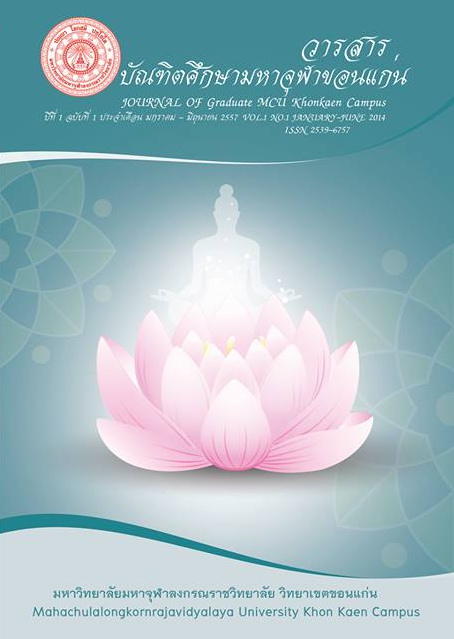An Analysis of The Principle of Buddhist Ethics for Solving Problems ff The Householder in Thai Society
Main Article Content
Abstract
The objectives of this research were: (1) to study the concept and problems about household, (2) to study Buddhist ethics for the household, and (3) to study analytically the Buddhist ethics for resolving the problems of household in Thai societies. This was a documentary research with the descriptive analysis. A result of this research study was found that the principles and the concept of the household were seen in many philosophical views: utilitarianism, hedonism, idealism, art appreciation, etc. The Buddhist ethics was a principle of a person’s real practice to achieve the highest objective. The Buddhist philosophy had three levels of the ethical principles: beginning-morality, middle-ten ways of meritorious making, and the end-Eightfold Noble Path, etc. For the householders, the Buddhist ethics had the practical principles as a way of life: four ways of sympathy for a good householder himself and the others, four virtues for the household life to grow love and harmony in Thai societies, etc. This Buddhist ethics was an important principle to live happily and contact the other peoples. A husband and a wife had to follow six directions with three possible aims: a visible or present benefit, an invisible or future benefit, and
the highest or best benefit. The Buddhist ethics for solving the problems of the household life was four virtues for a good household life: sincere, adjustment, patient, and sacrifice. The Buddhist ethics for solving the problems of the couple separation was four sublime states of mind: loving kindness, compassion,
sympathetic joy, and equanimity. The Buddhist ethics for solving the problems of taking care of children was a way to make a friend. The Buddhist ethics for solving the problems of habit-forming drug was the gratitude and bases of sympathy: giving, convincing speech, useful conduct, and equality in impartiality. The Buddhist ethics for solving the problem of leaving the old man was four virtues for a good household life in order to grow good action and happiness in the household as well as to grow the social development with peace and happiness
Article Details
References
พระธรรมปิฎก (ป.อ. ปยุตฺโต). (2538). คู่สร้างคู่สม : ชีวิตคู่ในอุดมคติ. (พิมพ์ครั้งที่ 8).กรุงเทพมหานคร : สหธรรมิก.
พระพรหมคุณาภรณ์ (ป.อ. ปยุตฺโต). (2554). ธรรมนูญชีวิต : พุทธจริยธรรมเพื่อชีวิตที่ดีงาม.(พิมพ์ครั้งที่ 17). กรุงเทพมหานคร : พิมพ์สวย.
มหาจุฬาลงกรณราชวิทยาลัย. (2539). พระไตรปิฎกฉบับภาษาไทย ฉบับมหาจุฬาลงกรณราชวิทยาลัย. กรุงเทพมหานคร : โรงพิมพ์มหาจุฬาลงกรณราชวิทยาลัย.
วศิน อินทสระ. (2544). จริยศาสตร์. (พิมพ์ครั้งที่ 4). กรุงเทพมหานคร : บรรณกิจ.
สัญญา สัญญาวิวัฒน์. (2544). สังคมวิทยาครอบครัว. กรุงเทพมหานคร : สํานักพิมพ์แห่งจุฬาลงกรณ์มหาวิทยาลัย.
หลวงวิจิตรวาทการ. (2549). วิชาการครองเรือนครองรัก. (พิมพ์ครั้งที่ 3). กรุงเทพมหานคร : สร้างสรรค์บุ๊คส์.

